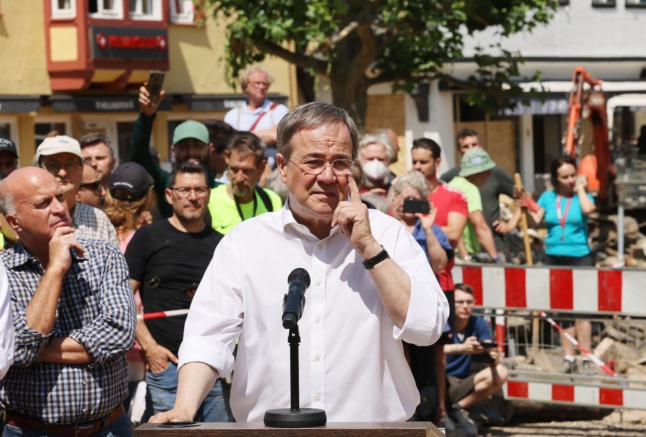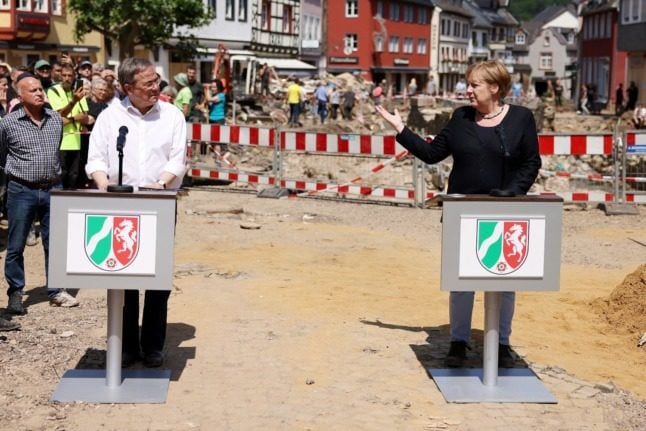Find all our coverage on the flood disaster HERE
As the death toll from the flooding has risen to more than 170 in Germany, Laschet’s response has revived a longstanding debate over his suitability to fill fellow conservative Merkel’s shoes when she retires after September’s election.
In a recent poll by the Civey institute for Spiegel magazine, only 26 percent of 5,000 respondents said they considered Laschet to be a good crisis-manager.
Laschet, who is currently state premier in Germany’s most populous state North-Rhine Westphalia, had already faced criticism for his hesitant, u-turn-prone handling of the pandemic.
And with his own state one of the worst-hit regions by last week’s deluge, he is now under fire for his gaffe-marred response to the disaster.
‘Communications disaster’
“Laschet took some time to find the right tone” after the floods hit, Hans Vorlaender, political scientist at Dresden’s Technical University, told AFP.
He pointed to a “communications disaster” over images that emerged last week.
The 60-year-old candidate was caught on camera convulsed in laughter with local officials as German president Frank-Walter Steinmeier in the foreground paid homage to the flood victims.
READ ALSO: German chancellor candidate Laschet sparks anger with flood zone laughter
German president Steinmeier delivers a sombre speech about help for communities devastated by floods while in background CDU chancellor candidate Armin Laschet appears to laugh himself silly about some joke:pic.twitter.com/gaGtqnLG8w
— Jeremy Cliffe (@JeremyCliffe) July 17, 2021
Though he later apologised for his “mistake”, Laschet faced fierce criticism online and in the German media.
“Does the supremely self-controlled Merkel really trust this man, who has shown no self-control, with her job?” demanded Der Spiegel weekly.
“It is no laughing matter! If Laschet wants to be chancellor, he has to be able to manage crises. This would not have happened to Merkel,” wrote Berlin daily Der Tagesspiegel.
While the veteran leader has long been praised for her steely nerves under fire, Laschet has often shown “a lack of determination”, Vorlaender told AFP.
“In general, politicians show what they are capable of in times of crisis,” he said, pointing not only to Merkel, but also to her predecessor Gerhard Schroeder, who impressed voters with his hands-on response to floods ahead of his re-election in 2002.
In a survey this week for the Forsa institute, meanwhile, Laschet and Merkel’s CDU/CSU alliance was polling two points lower than the previous week on 28 percent.
By Friday, however, a poll for public broadcaster ARD showed the conservatives up a point to 29 percent.

Climate debate
With a lead of around 10 points ahead of the opposition Greens party in second place, Laschet is still the strong favourite to succeed Merkel.
In recent months, he has benefited from a collapse in support for the Greens, whose initially strong campaign was hit hard with a series of missteps by co leader and candidate Annalena Baerbock.
Yet the floods have slowed his march to victory and returned climate policy to the top of the agenda just two months before the election.
READ ALSO: How the extreme flooding in Germany is linked to global warming
The ARD poll showed 81 percent of Germans seeing a need for stronger action to protect the climate.
“The floods have shown the urgent need for climate policies,” wrote Der Tagesspiegel, while Merkel herself called for “speeding up” the fight against climate change as she leaves the stage.
“Laschet needs to set clear goals and go beyond what is in the conservatives’ manifesto,” Vorlaender said, as natural disasters become more frequent due to global warming.
Merkel’s ruling right-left coalition tightened its emissions targets in May to put the country on course for carbon neutrality by 2045.
Bavarian state premier Markus Söder, who mounted a fierce challenge against Laschet for the conservative candidacy in the spring, has increased the pressure by setting an ambitious goal of phasing out coal by 2030 – eight years ahead of deadline set by the federal government.
As premier of a coal-dominated region, Laschet has been considerably more cautious on climate issues.
And that has not been lost on voters. In a Civey poll on Wednesday, just 26 percent said they believed Laschet would provide effective climate protection policies.
READ ALSO: Merkel demands faster action on climate change as German flood deaths rise




 Please whitelist us to continue reading.
Please whitelist us to continue reading.
Member comments